
Journal of Forest Science
Scope & Guideline
Exploring the intersection of ecology and forestry.
Introduction
Aims and Scopes
- Forest Ecology and Biodiversity:
The journal publishes studies that investigate forest ecosystems' structure, function, and biodiversity, emphasizing the importance of maintaining ecological balance and conservation. - Forest Management and Silviculture:
Research related to various forest management practices, including sustainable forestry, thinning methods, and regeneration techniques, is a core focus, providing insights into optimizing forest productivity while conserving resources. - Impact of Climate Change on Forests:
Numerous articles explore how climate change affects forest health, species composition, and ecosystem services, highlighting the urgency of addressing climate-related challenges in forestry. - Forest Economics and Policy:
The journal covers the economic aspects of forestry, including the evaluation of forest resources, market trends, and policies affecting forest management and conservation. - Technological Innovations in Forestry:
The journal embraces new technologies and methodologies in forest research, including remote sensing, modeling, and genetic studies, to enhance understanding and management of forest resources. - Ecosystem Services Provided by Forests:
Research that evaluates and quantifies the ecosystem services provided by forests, such as carbon sequestration, water regulation, and recreational opportunities, is increasingly prevalent.
Trending and Emerging
- Climate Resilience and Adaptive Management:
Research focusing on enhancing the resilience of forest ecosystems to climate change is increasingly prominent, emphasizing adaptive management strategies that can mitigate adverse effects. - Integration of Indigenous Knowledge and Practices:
There is a growing trend towards recognizing and integrating indigenous knowledge and practices in sustainable forest management, reflecting a more inclusive approach to forestry. - Forest Carbon Dynamics and Climate Mitigation:
Studies investigating carbon stocks, carbon sequestration potential, and the role of forests in climate change mitigation are on the rise, aligning with global efforts to combat climate change. - Technological Advances in Forest Monitoring:
The adoption of advanced technologies, such as remote sensing and machine learning, for monitoring forest health and dynamics is increasingly featured, showcasing innovative approaches in forest science. - Socio-economic Impacts of Forestry:
Research addressing the socio-economic aspects of forestry, including community engagement, economic benefits, and the role of forests in rural development, is gaining prominence.
Declining or Waning
- Traditional Afforestation Techniques:
Research focusing solely on traditional methods of afforestation has decreased, as the journal shifts towards innovative approaches that incorporate technology and ecological considerations. - Invasive Species Management:
There is a noticeable decline in studies addressing invasive species management in forests, which may reflect a broader trend of prioritizing native species conservation and ecosystem restoration. - Historical Forestry Practices:
Papers focusing on historical forestry practices are less common, suggesting a shift towards contemporary issues and methodologies that align with current challenges in forest science. - Single-species Studies:
The emphasis on studies centered around single tree species is waning, with a growing preference for research that considers multi-species interactions and ecosystem dynamics.
Similar Journals

Forest Ecosystems
Fostering innovation in forestry and ecology.Forest Ecosystems is a prestigious open access journal published by KEAI PUBLISHING LTD, dedicated to advancing knowledge in the fields of forestry, ecology, and conservation. Established in 2014 and located in Beijing, China, this journal has rapidly gained prominence, achieving Q1 status in multiple categories, including Ecology, Evolution, Behavior and Systematics, and Forestry in 2023. With an impressive rank of 19 out of 174 in the Scopus category of Agricultural and Biological Sciences - Forestry, it stands in the 89th percentile, reflecting its influential contributions to the field. The journal fosters scholarly discourse and disseminates innovative research aimed at understanding forest ecosystems and their vital role in our environment. Offering a robust platform for researchers, professionals, and students, Forest Ecosystems ensures accessibility through its open access format, enabling a wider audience to engage with and benefit from cutting-edge research dedicated to the stewardship of forest resources.
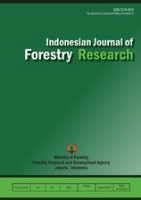
Indonesian Journal of Forestry Research
Connecting knowledge to practice in sustainable forestry.The Indonesian Journal of Forestry Research is a distinguished, peer-reviewed academic journal published by the Ministry of Environment & Forestry of Indonesia. With an ISSN of 2355-7079 and E-ISSN 2406-8195, this journal has been an Open Access platform since 2014, fostering international collaboration and knowledge sharing in the fields of ecology and forestry. As of 2023, the journal holds a respectable Q3 category in both Ecology and Forestry, reflecting its contribution to the science community. It ranks #99/174 in Forestry and #305/461 in Ecology in Scopus, indicating its growing influence in the respective fields. Aimed at researchers, professionals, and students, the Indonesian Journal of Forestry Research provides vital insights and findings, supporting sustainable forestry practices and environmental management in Indonesia and beyond. With an emphasis on innovative methodologies and applied research, this journal stands as a pivotal resource for those dedicated to advancing forestry science and ecological research.

SILVA FENNICA
Fostering Sustainable Practices Through Open Access ResearchSILVA FENNICA, publishing since 1976, is a premier open-access journal dedicated to the advancement of knowledge in the fields of Forestry and Ecological Modeling. Released under the stewardship of the Finnish Society of Forest Science in collaboration with the Natural Resources Institute Finland, this journal serves as a vital resource for researchers, professionals, and students alike, fostering the exchange of innovative ideas and research findings. With an impressive impact factor placed in the Q1 category for Forestry and holding a commendable Q3 position in Ecological Modeling as of 2023, SILVA FENNICA illustrates its significance by ranking 47th in Forestry and 19th in Ecological Modeling according to Scopus metrics, reflecting a robust peer recognition and dissemination of scholarly work. The journal offers open access to all published articles since 1998, ensuring wide visibility and accessibility of research outputs. Located in Finland, SILVA FENNICA invites contributions that address sustainable forestry practices, forest ecology, and ecological modeling with a commitment to promoting scientific discussion and environmental stewardship.

Lesnoy Zhurnal-Forestry Journal
Pioneering Research for Responsible Forestry PracticesLesnoy Zhurnal-Forestry Journal is a prominent academic publication dedicated to advancing the field of forestry and environmental sciences. Published by the Northern Arctic Federal University M. V. Lomonosov, this journal focuses on innovative research, practices, and policies related to forestry management and conservation. With an Open Access model established since 2015, the journal ensures widespread dissemination of knowledge and foster collaborative research across global scholarly communities. Located in Arkhangelsk, Russia, the Lesnoy Zhurnal appeals to researchers, professionals, and students alike, providing a platform for sharing valuable insights and addressing emerging challenges in forestry. Though specific metrics like HIndex and Scopus rankings are presently unlisted, the journal is committed to excellence and aims to enhance its visibility and impact within the scientific community. This publication is not only a critical resource for ongoing research but a key player in shaping sustainable forestry practices in a rapidly changing environment, making it indispensable for anyone involved in forestry and environmental studies.
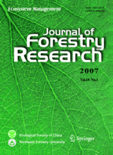
JOURNAL OF FORESTRY RESEARCH
Advancing forestry science for a sustainable future.JOURNAL OF FORESTRY RESEARCH, published by Northeast Forestry University in China, stands as a pivotal platform for advancing the field of forestry science. With an ISSN of 1007-662X and an E-ISSN of 1993-0607, this esteemed journal has maintained its commitment to disseminating high-quality research since its inception in 1997, converging into a recognized authority through the years. Currently boasting a Q1 ranking in the Forestry category for 2023, it ranks 18th out of 174 journals in its field on Scopus, highlighting its vital role in shaping contemporary forestry studies. The journal focuses on a broad spectrum of topics pertinent to forestry, including sustainable forest management, ecology, and conservation efforts, making it an indispensable resource for researchers, professionals, and students alike. Although it is not an open-access publication, the insights shared within its pages promise to contribute significantly to the advancement of knowledge and practices in forestry. The journal's significant impact and relevance are underscored by its operations from Harbin, People's Republic of China, where it continues to foster scholarly communication in the world of forestry research.
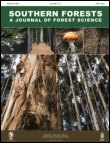
Southern Forests-A Journal of Forest Science
Exploring the Depths of Forest Science and EcologySouthern Forests: A Journal of Forest Science, published by Taylor & Francis Ltd, serves as a vital platform for scholarly discourse in the field of forestry. With a robust ISSN of 2070-2620 and E-ISSN of 2070-2639, this journal highlights cutting-edge research and vital advancements from 2008 to 2024. Based in the United Kingdom, it continues to make significant contributions, evidenced by its current Q3 ranking in the forestry category of Scopus as well as its rank of 94 out of 174 in Agricultural and Biological Sciences. This journal caters to a diverse audience of researchers, professionals, and students, providing access to high-quality articles that promote sustainable forest management and ecological studies. Despite being classified as a non-open access journal, it remains a key resource, ensuring accessibility to crucial information that addresses both local and global forest challenges.
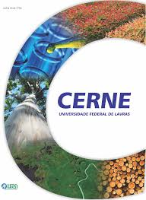
Cerne
Cultivating Knowledge for Forest SustainabilityCerne is a distinguished open-access journal dedicated to advancing knowledge in the field of forestry, published by the Universidade Federal de Lavras (UFLA). Since its inception in 1994, the journal has actively contributed to the global discourse on sustainable forest management and biodiversity conservation, presenting research findings that are both relevant and impactful. With its ISSN 0104-7760, Cerne aims to foster collaboration among researchers, professionals, and students, enhancing the understanding of forestry practices in Brazil and beyond. As of 2023, it holds a respectable Q3 ranking in the forestry category, further cementing its position within the academic community, illustrated by a Scopus ranking of #97 out of 174 in the Agricultural and Biological Sciences - Forestry field. Operating under an open-access model allows for wide dissemination of research outputs, ensuring that critical findings reach a broad audience, fueling further innovation and discovery in the field. With converged years extending from 2007 to 2024, Cerne continues to be a vital resource for anyone engaged in forestry research and practices.

Madera y Bosques
Championing Biodiversity and Climate ResilienceMadera y Bosques is a prominent academic journal specializing in the fields of forestry and wood science, published by INST ECOLOGIA A C in Mexico. With an ISSN of 1405-0471 and an E-ISSN of 2448-7597, it has established itself as a vital platform for disseminating research findings, innovative practices, and methodologies pertinent to sustainable forest management and ecological conservation. Operating since 2008, the journal covers a wide scope of topics related to the complexities of forest ecosystems, the importance of biodiversity, and the challenges posed by climate change. Despite its categorization in Q4 for the year 2023 in the Forestry category, Madera y Bosques aims to elevate discourse and practice in the field, providing a voice to emerging researchers and seasoned professionals alike. Additionally, the journal adheres to open access principles, enhancing the visibility and accessibility of its articles to a global audience. Researchers and practitioners are encouraged to engage with its rich content to further their understanding and impact in the world of forestry.
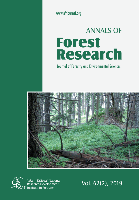
Annals of Forest Research
Exploring sustainable solutions for forest ecosystems.Annals of Forest Research is a peer-reviewed journal dedicated to advancing knowledge in the fields of forestry, ecology, and plant sciences. Published by EDITURA SILVICA in Romania, this journal has been an open access publication since 2008, providing a platform for researchers to share their insights and findings with a global audience. The journal operates under a rigorous selection process, reflected in its positioning within the Q2 category in Forestry and Q3 in both Ecology and Plant Science as of 2023. With Scopus rankings indicating a solid percentile among its peers, Annals of Forest Research continues to play a vital role in disseminating innovative research and fostering scholarly dialogue. Researchers, professionals, and students are encouraged to explore its diverse range of articles, which address both foundational and contemporary issues in forest management and environmental sustainability, contributing to the sustainable use and preservation of forest ecosystems.
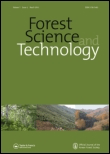
Forest Science and Technology
Empowering environmental solutions with cutting-edge science.Forest Science and Technology is a premier open access journal published by Taylor & Francis Ltd, based in the United Kingdom. Established in 2005, this journal has become a key platform for disseminating high-quality research in the fields of Forestry and Environmental Science, maintaining a strong impact factor and impressive Scopus rankings. As of 2023, it proudly holds a Q2 quartile ranking in Forestry and a Q3 quartile ranking in Management, Policy, and Law categories, highlighting its significance in addressing contemporary challenges in forest management and conservation. With a dedication to fostering scholarly communication, the journal supports open access since 2017, making valuable findings accessible to a wider audience, including researchers, professionals, and students. With the coverage period extending to 2024, Forest Science and Technology continues to contribute to the discourse on sustainable forestry practices and innovative management strategies.